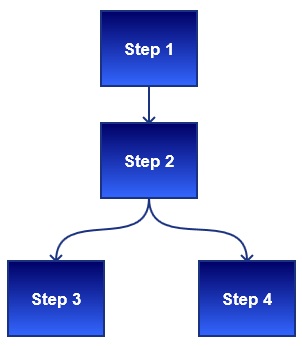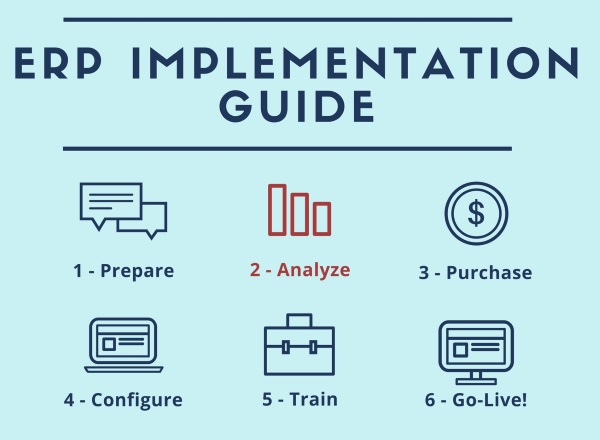Let me be clear: the business analysis is the most important step of any ERP implementation project.
Don’t do it and I guarantee it will lead to the project’s failure.
What is a business analysis?
In this phase of the ERP implementation, you’ll analyze the whole business to be able to choose the best ERP possible.
The goal here is to make sure you know exactly what you need in an ERP and get the best out of it.
Advantages of a good Business Analysis
Apart from the fact that you’ll waste your time & money if you don’t do it, there are 3 main advantages in investing in a good business analysis:
- The ERP you’ll choose will better fit your company
- You’ll get a better Return on Investment on your ERP
- It will increase employees’ satisfaction
Complete Business Analysis in 2 Steps
There are 2 steps to a successful Business Analysis
The first step will provide a mapping of all your processes. It’s going to show how your company works, how it does things. This way, you’ll be able to see if an ERP is a fit for you and make sure it’s configured the best way possible.
The second step will provide a document that details everything your company needs. By working with the managers and the employees, we’ll be able to provide a detailed list of everything the ERP has to provide to satisfy the requirements of everyone, from top to bottom.
I cannot overstate the importance of doing a good business analysis. It is the foundation of an ERP implementation project. You will refer to this analysis at every step until the Deployment.
Do it right!
Step 1 – Process Analysis
The first step of a business analysis is the Business Process Analysis.
What is a business process analysis?
How do we do what we do?
During this phase, you’ll be mapping your business processes. You want to document exactly how your company works, the step-by-step processes that the company uses to produce a good or a service.
Why do a business process analysis?

Some ERP will be a fit for your company, some will not.
Every company and ERP are different. How do you know if an ERP is a fit? By analyzing your internal processes and comparing it to the ERP’s processes.
Also, once you’ve chosen your ERP and begin the configuration, the vendor’s team will need to know exactly how the company works. The more details you give them, the better they will do their job, the better return on investment you’ll get from you ERP.
Are your processes clogged?
Another advantage to a good process analysis is that it’ll allow you to optimize your processes. Over time and especially in fast growing companies, inefficiencies are added to the process.
Add a check here, create a document there, add a quality control in the middle, etc.
After a while, your processes are going to be inefficient and you want to implement an ERP on an efficient process. Otherwise, it’s like adding an old rusty engine to a new car. It might work, but it’s not the best thing to do!
How long does it take?
This phase is often a project of its own that you should start months before starting the ERP implementation project.
Give yourselves time to do it right. Make sure that you can test and adopt the new processes – if needed – before having to face another big change, the ERP implementation.
By the end of this phase, you’ll have an optimized business process and you’ll be able to start the second step of the business analysis: the business needs analysis.
Step 2 – Needs Analysis
You wouldn’t buy a house without asking yourself what you want and need right?
If you have 5 kids, buying a 1 room studio downtown is not the greatest idea. How many rooms do you need? How many bathroom? Backyard? Pool? Location?
Same goes with an ERP. You cannot choose an ERP without know exactly what you need. How do you figure out exactly what you need?
By doing a Business Needs Analysis.
Why do a Business Needs Analysis
A thorough business needs analysis gives you a mean of knowing exactly what everyone needs in the company. Every department, from higher-management to employees.
After that you’ll be in a much better position to choose the ERP that best fits your company.
How long does it take?

This task will take anywhere from a couple of weeks to a couple of months. Take your time.
Once the ERP is deployed, you’ll have spent hundreds of thousand of dollars on it. Figuring out that you forgot something important is a major problem (to be polite!)
What do we do during a Needs Analysis?
During this phase, you’ll document the needs of each department.
It will consist of a lot of meeting and discussions with the management, the super-users and the end-users. By the end of this phase, you’ll have a document that clearly defines the business needs for the new ERP implementation.
Tips for the Business Analysis phase
Start early
A Business Analysis might take longer than you imagine. You might figure out that you want to changes things. You might need a lot of discussion between departments to decide how you’ll work in the future.
Give yourself time to do it right. Don’t rush it.
The employees’ input is crucial
A common mistake made by companies is that the business analysis is often done by the management. Their input is important, but no company should overlook their employees’ input.
In fact, when doing a business analysis, prefer input from users than managers.
The users are the one that will ultimately use and feed the system, so their opinion is of prime importance. If they feel that the ERP system is slowing them down or is not answering their needs, they won’t use it well.
That will result in a less efficient ERP and a much longer return on investment.
Choose the right professionals & super-users
It’s such an important phase that you want to make sure you have the right people for the job.
Choose carefully your super-users. They’ll make a lot of decisions on how the ERP is going to work. Make sure they are knowledgeable and that they’ll have time to devote to the project.
Hire a competent business analyst with experience. Not only will he help you during this phase, he’ll help you during the whole ERP implementation phase.
Final note
The business analysis is the foundation of an ERP implementation project.
Take your time, make sure there is a clear consensus from the employees and make sure the management agrees with the direction the project is taking.
What’s next?
Once you have clearly defined your processes & needs, it’s time to start the buying process.
Home > ERP Implementation Project > Business Analysis

